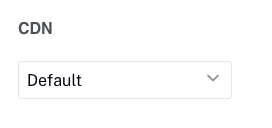Configuring Bring-Your-Own (BYO) CDN for NextGen Live Playback
Prerequisites
- Shared BCOV token from Brightcove Support.
- Your Hostname value that pairs with the token.
- Ability to configure your CDN/reverse proxy origin, request headers, and cache behavior.
- HTTPS/TLS enabled for origin fetches.
Quick start
- Set the BYO origin to
https://playback.live.brightcove.com. - Append an auth header on origin requests:
BCOV-CDN-Auth: <token-shared-by-support>. Do not require clients to send this header and do not expose it downstream. - Set the forwarded host header on origin requests:
X-Forwarded-Host: <hostname-assigned-to-token>. The value must exactly match the hostname. - Respect origin caching: Honor
Cache-Control,Expires,Last-Modified, and any relevantVarydirectives. Do not override with more/less aggressive policies. - Deploy and validate using the checks below.
CDN selection in the Live module
Once a BYO CDN has been configured manually with Brightcove Support, it can be set as the default CDN for the account or configured as a secondary CDN alongside Brightcove’s default CDN.
If configured as a secondary CDN, users can select which CDN to use from the Live module user interface when creating or editing a Live event (scroll down to the CDN section).

Validation & troubleshooting
Quick checks
- Confirm in CDN logs or origin debug tools that requests to Brightcove include both headers with expected values.
- Request a known live playback URL through your BYO edge and verify successful playback and expected cache behavior (e.g., presence of
Cache-Control). - Verify that private headers (
BCOV-CDN-Auth,X-Forwarded-Host) are not exposed to clients.
Failure-path checks
- Missing token → Expect
401/403 - Bad token → Expect
401/403 - Wrong or mismatched
X-Forwarded-Host→ Expect403
Cache behavior
- Verify
Cache-Controlheaders from the origin are preserved. - Repeat requests should show increasing
Agewhen served from cache.
Common pitfalls
- Adding headers to client responses instead of origin requests
- Enforcing a fixed CDN TTL that conflicts with origin
Cache-Control - Typos or case differences in
X-Forwarded-Hostvs. the hostname - Leaking
BCOV-CDN-Authdownstream to clients - Overriding the
Hostheader for origin fetches (unless instructed by Support)
